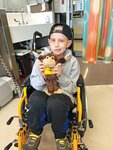

Lakebay resident Brayden VanderDoes, 9, stood in front of a large brass ship’s bell mounted in a Seattle Children’s Hospital lobby, surrounded by family, staff and fellow patients Aug. 11.
He was a little embarrassed.
“I felt like, where am I supposed to go? Am I supposed to do this?” he said.
Someone yelled, “Ring it! Ring it loud!”
He pulled the rope and the crowd burst into applause.
Brayden had just signaled the end of 14 months of treatment for his brain cancer.
“I don’t know where it (the ritual) came from,” said his mother, Amy VanderDoes. “But I do know it was something we’d been looking forward to for a long time.”
Brayden got sick in the fall of 2021 when he was in second grade at Evergreen Elementary School. He vomited in the mornings. He began to lose his balance. He had to keep one eye closed because of double vision. He couldn’t ride his bike anymore.
There were blood tests, X-rays, a CT scan, an endoscopy and, finally, after eight months, an MRI at Mary Bridge Children’s Hospital in Tacoma.
“We thought we were just going to go in, get an MRI, and wait for a couple days for answers,” Amy said. “But that’s not what happened.”
Brayden was immediately sent to Seattle Children’s Hospital and underwent a seven-hour brain surgery that night.
He was diagnosed with medulloblastoma (muh-dul-o-blas-TOE-muh), an aggressive pediatric brain cancer that starts in the cerebellum, which governs muscle coordination, balance and movement. While rare, striking just 500 children in the U.S. each year, it is the most common cancerous brain tumor in kids, who have a 70% survival rate.
Brayden had just turned 8 years old. He missed the end of second grade.
He spent the next five weeks in the hospital recovering from surgery, which paralyzed part of his face and affected his speech. He spent the time relearning how to talk and walk on his own, dangling from a harness while stepping on blocks.
Then came six weeks of radiation, which he completed just in time to start third grade and a year of chemotherapy.
“He was still pretty wobbly, so we had some accommodations in place,” said Amy, who is a secretary at Evergreen.
Brayden fatigued quickly and had lost weight and all his hair. So did his dad, Martin, who shaved his head in solidarity. His parents were worried about him returning to school, even with Amy there. Other kids might not understand. They might be afraid of him and not want to be his friend.
When Brayden missed school for treatments or illness, a big stuffed monkey named Buddy took his place.
“He does all the work for me when I’m gone,” Brayden said.
It was part of a program promoted by Children’s Hospital called Monkey in My Chair, created in honor of Chloe Watson Feyerherm for children who miss school because of cancer.
“They take it very seriously, taking it everywhere they go and making sure he’s doing his work for Brayden,” said his teacher, Alena Shepard, describing Brayden’s classmates. “They can definitely tell what it represents.”
Brayden kept a small version of Buddy with him when he was gone and would exchange photos of the two monkeys, at school or the hospital, with his classmates.
“It’s hard watching any child go through anything so terrible, and then once you get to know them, it’s really tough,” Shepard said. “We talked about being empathetic (with her class), going out of our way to be kind to him, including him. But it was hard for them sometimes. Students would come up to me and ask ‘Is there anything I can do for Brayden? He’s not going to die, right?’ Sometimes it was tough for them.”
It was her second year of teaching.
All told Brayden’s treatment included 30 radiation doses, 44 chemo infusions, five surgeries, three blood transfusions, 51 inpatient hospital days, 87 outpatient appointments, and seven trips to the ER or Urgent Care. In February 2023, the VanderDoes’ home was nearly destroyed by fire and the family had to relocate. It’s still being rebuilt.
At the end of third grade, Brayden gave the small stuffed Buddy to Shepard as a thank you. The big one sits on his bed at home.
Brayden is now in Shepard’s fourth-grade class.
“People are seeing more of his personality now and so am I,” she said. “He’s always doing the right thing, going out of his way to be extra kind to people.”
Since about 30% of children with medulloblastoma experience a relapse, Brayden will be followed by medical teams for many years.
“Chemotherapy caused some hearing loss, so his hearing will continue being monitored and he is continuing to receive physical therapy for his balance,” Amy said. “He also has a neuropsychology and endocrinology team that will help him through the various side effects he will have throughout his life from his cancer treatment.”
Brayden and his dad go swimming every week at the YMCA in Gig Harbor and finish the day with a slow run around the track. He’s got his eye on the climbing wall there too. “That looks like maybe it’s fun,” he said.
But he takes it easy on the playground and hasn’t been back on a bicycle. “I’ll probably get too tired,” he said.
“That isn’t something that we’ve tried yet, but riding his bike is something that he really does want to start,” Amy said. “He had to relearn how to walk, so I know the bike will be a learning curve. But we want to do that. He loved riding his bike so much before.”
Brayden had some advice for other kids going through cancer. “Get one dollar for every radiation” session. And then he added, “Keep going.”
He wants to be a scientist when he grows up. “I want to invent medicines and cure things,” he said. “Like cancer.”
UNDERWRITTEN BY THE FUND FOR NONPROFIT NEWS (NEWSMATCH) AT THE MIAMI FOUNDATION, THE ANGEL GUILD, ADVERTISERS, DONORS AND PEOPLE WHO SUPPORT INDEPENDENT, NONPROFIT LOCAL NEWS